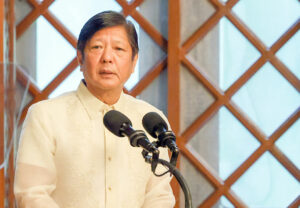Marcos signals more liberal economic measures

By Kyle Aristophere T. Atienza, Reporter
PRESIDENT Ferdinand R. Marcos, Jr. on Thursday gave strong indications that his administration would pursue more liberal economic reforms, saying the Philippines’ “wealth” should be defined by the amount of trade it pursued.
“We cannot continue to hide behind protectionist laws and protectionist policies,” he said at the launch of the green lanes for strategic investments, based on a transcript from the presidential palace. “No country ever got wealthy by following a protectionist policy.”
Mr. Marcos, who had vowed to protect the domestic agriculture sector against price competition from imports, said the “wealth of a nation is defined by the amount of trade that it has gone [through].”
“We can look back many centuries and it has always been trade that has been the key to the wealth of any nation, of any system, of any economic system,” he said.
Early in his term, Mr. Marcos vowed to protect the agriculture sector by, among others, limiting imports as much as possible.
He had underscored the need for the Philippines to boost domestic industries amid global uncertainties, citing the impact of the conflict between Russia and Ukraine on food and energy security.
But that promise has yet to be fulfilled as the country ramps up food imports in response to supply shortages and price increases.
In May, Mr. Marcos approved the importation of at least 150,000 metric tons of sugar, citing possible supply shortage. Sugar prices have soared to as much as P130 per kilogram.
Liberalization has been the default economic policy in the country since the 1980s — the years when the late president Ferdinand E. Marcos ruled the country — until today, said Joseph M. Purugganan, convenor of Trade Justice Pilipinas.
He noted that Philippine tariff rates have “gone down so much already to almost zero” for most commodities.
“The issue consistently raised by Trade Justice advocates is whether trade and investment liberalization has worked for us, particularly for the working class,” he said in a Facebook Messenger chat.
Under the younger Marcos’ administration, the Philippines ratified the Regional Comprehensive Economic Partnership (RCEP), the world’s largest free trade deal.
RCEP, which covers nearly a third of the global population and about 30% of its global gross domestic product, took effect locally on June 2.
“The recent debates over RCEP, for example, has shown that the agriculture sector — farmers and fishers — are of the view that trade liberalization has not worked for them,” Mr. Purugganan said, “and the promised benefits from joining the World Trade Organization, and other free trade agreements (FTAs) has not materialized.”
The Marcos administration is seeking to enter into an FTA with the European Union. The United States, on the other hand, is not keen on having the same trade deal with the Philippines.
“It is clear that simply opening up our markets/economy to imports, and capital does not necessarily equate to development, especially the kind that benefits the working class,” Mr. Purugganan said, citing the weakness of Philippine industries, including the agriculture and manufacturing sectors.
“On the other hand, what we have seen is that these policies have worsened inequality and wealth concentration, destroyed the environment and exacerbated the climate crisis, and eroded human rights.”
Sonny A. Africa of IBON Foundation reminded Mr. Marcos that protectionism has been resurgent in the US and Europe after the pandemic caused supply chain disruptions and is ever-present in Japan.
“No country has ever developed without going through an initial phase of protectionism… The president is grossly misinformed which prevents the ‘comprehensive all-inclusive economic transformation’ he promised at his inauguration,” he said via Messenger chat.
In pursuing reforms that would further open the economy to foreign investments, the government should take extra efforts to boost domestic sectors, Emy Ruth S. Gianan, who teaches economics at the Polytechnic University of the Philippines, said in a Facebook Messenger chat.
Ms. Gianan said the government should ensure the “readiness” of the domestic economy to absorb foreign investments and compete fairly “to spur a more balanced growth.”
Mr. Marcos’ promise to pursue liberal economic reforms was made a day after his Trade chief announced that the growth of the export sector will heavily rely on foreign investments.
“If we do so, we will only be propagating the same import-dependent, capital-intensive exports that we now have,” Leonardo A. Lanzona, who teaches economics at the Ateneo de Manila University, said via Messenger chat.
“Exports are initially developed endogenously either by increasing products where we have comparative advantage or by creating differentiated products that can compete with existing products,” he said. “All of these can be promoted if the government creates an enabling environment for private sectors to be more efficient and creative.”
GREEN LANESDuring Thursday’s event, Mr. Marcos said he hopes that the establishment of green lanes will pave the way for the entry of more strategic investments.
“I am confident that the Green Lanes will pave the way for the realization of many pledges that we have had — including those that I have personally received whilst abroad — ensuring that they will bear fruit for our people and our nation,” he said.
Established through Executive Order No. 18, the green lanes will expedite, streamline, and automate government processes for strategic investments.
Mr. Marcos said the creation of green lanes complements the amendments to laws such as the Public Service Act, the Foreign Investment Act, and the Retail Trade Liberalization Act — laws that he said will help “promote our country as a top investment destination.”
Mr. Marcos said that for the Philippines to “compete vigorously” with Southeast Asian nations in terms of attractiveness to foreign investments, it needs to improve in the area of ease of doing business.
In the Philippines, there are some permits that take 36 months to complete, Mr. Marcos said. “Whereas you go to Thailand, you go to Indonesia, you go to Vietnam, they take two weeks to complete.”
“The establishment of a foreign firm in our place, we have reduced it now from 80 days to 20 plus days,” he said. “Still, we have ways to go. You go to the countries that I have mentioned, it takes three days. And this is why we must do this.”
Meanwhile, the Board of Investments (BoI) is sticking with its P1.5-trillion investment pledges target for 2023.
“We’ll stick (with the 2023 investment target). It is difficult to have a moving target… If we exceed it, fine. If we fall behind, then we will work harder,” BoI Chair and Trade Secretary Alfredo E. Pascual told reporters on Thursday.
The BoI will now be the single entry point for investors. It will establish a one-stop action center for strategic investments.
“Then they will be guided as they go through the process. The Department of Interior and Local Government will talk to the local government units, which will have an officer or a team that will be in charge of taking care of strategic investors,” Mr. Pascual said.
SunAsia was the first investor to receive a certificate of endorsement for the green lanes. The company will develop floating solar panels on Laguna Lake, which will generate 1.3 gigawatts of power.
In the same event, the government also launched the Online Platform for Green Lane Services. — with inputs from R.M.D.Ochave




